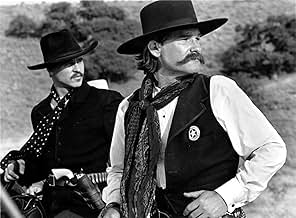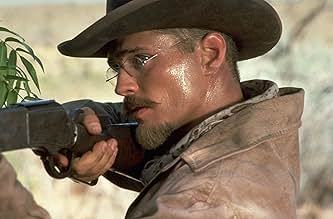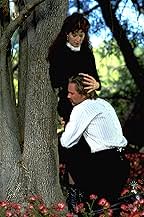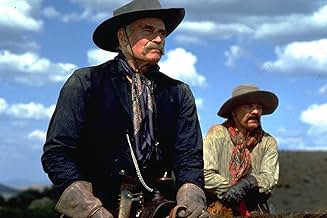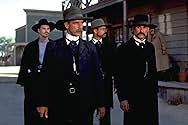A successful lawman's plans to retire anonymously in Tombstone, Arizona, are disrupted by the kind of outlaws he was famous for eliminating.A successful lawman's plans to retire anonymously in Tombstone, Arizona, are disrupted by the kind of outlaws he was famous for eliminating.A successful lawman's plans to retire anonymously in Tombstone, Arizona, are disrupted by the kind of outlaws he was famous for eliminating.
- Awards
- 2 nominations
- Directors
- Writer
- All cast & crew
- Production, box office & more at IMDbPro
Storyline
Did you know
- TriviaThe line quoted by Doc at the end of the fight at the O.K. Corral is historically true, and was reported in the Tombstone papers reporting the fight. When confronted by one of the cowboys at point blank range, the cowboy reportedly said, "I got you now Doc, you son of a bitch!", to which Doc gleefully retorted, "You're a daisy if you do!"
- GoofsContrary to the film, Fred White did not die immediately after being shot by Curly Bill, but lingered long enough to testify that he himself thought the shooting was accidental. It was White's testimony, combined with evidence that the guns had a hair trigger, that acquitted Curly Bill, not Cowboy intimidation of potential witnesses.
- Quotes
Johnny Ringo: My fight's not with you, Holliday.
Doc Holliday: I beg to differ, sir. We started a game we never got to finish. "Play for Blood," remember?
Johnny Ringo: Oh that. I was just foolin' about.
Doc Holliday: I wasn't.
- Crazy creditsFor Birgitta C.
- Alternate versionsA "Vista Series" director's cut was released in February 2002. Just under five minutes of never-before-seen footage were restored. The most noticeable are:
- a scene showing the depths of Mattie's addiction to laudanum and her jealousy over Josephine;
- a somber soliloquy by Doc quoting Kublai Khan;
- a scene explaining Kate's sudden disappearance from the film, with Doc stressing the importance of friendship;
- a scene with McMasters and the Cowboys meeting one last time. A small scene showing the graphic result of that meeting has been re-inserted, with the line "They got McMasters!" being moved into this small insert.
Featured review
A Terrific Homage to Classic Westerns!
TOMBSTONE, one of two epic westerns about Wyatt Earp released within a few months of each other (1993-94) lacks the lyrical, 'warts-and-all' quality of Kevin Costner's WYATT EARP, but is a more successful film, with tighter pacing, more clearly drawn characters, and a reverence to the genre that has made it the most popular Western of the last twenty years.
From the opening scene, narrated by the legendary Robert Mitchum, a nod to the great Hollywood Westerns of the past is evident; a gang of outlaws calling themselves 'The Cowboys' break up a Mexican wedding in a small town, ruthlessly killing nearly all the men, including village priest Pedro Armendáriz Jr. (son of the legendary Western actor), in a scene reminiscent of ONCE UPON A TIME IN THE WEST, and THE MAGNIFICENT SEVEN. Led by two of Hollywood's flashiest character actors, swaggering Powers Boothe, and coldly psychotic Michael Biehn (playing Johnny Ringo), the presence of such pure evil sets the stage for the Earps' arrival in Tombstone.
A powerful cast is essential for a great Western, and you couldn't find a better group of actors as the Earp brothers; Kurt Russell, chiseled, squinty-eyed, and razor-thin, is an ideal Wyatt; Sam Elliott, one of Hollywood's best Western actors, plays Virgil with a growl but a twinkle in his eye; and Bill Paxton, soon to achieve stardom in APOLLO 13 and TWISTER, makes a terrific Morgan. Then there is Val Kilmer, as Doc Holliday...While Dennis Quaid, in WYATT EARP, gave the most realistic portrayal of the dying dentist-turned-gambler/gunfighter ever recorded on film (he was superb), Kilmer, relying on bloodshot eyes, an ambiguous sexuality, and a Brando-esque line delivery, literally steals TOMBSTONE, and has become the 'Doc' everyone remembers. He is so charismatic that you nearly forget that the Earps are the focus of the story! Watch for his early scene confronting a shotgun-wielding (and chubby!) Billy Bob Thornton (three years before SLING BLADE), out to kill Wyatt, and you'll see my point.
The events leading up to the famous Gunfight at the O.K. Corral are clearly and decisively presented, from Wyatt's first meeting with future wife Josie (Dana Delany), to the murder of Tombstone's Marshal (Harry Carey, Jr., son of another legendary Western star, and a staple of many John Ford films), which leads to Virgil taking the badge and making his brothers (in Wyatt's case, reluctantly) deputies, to the friction with Ike Clanton (GODS AND GENERALS' Stephen Lang) that explodes into the short but bloody shootout that became legendary.
Where TOMBSTONE and WYATT EARP both excel is in presenting the aftermath of the gunfight. Unlike MY DARLING CLEMENTINE or GUNFIGHT AT THE O.K. CORRAL, the true story doesn't tie up neatly with a happy ending at the Corral, but becomes darker and bloodier. The Earps are placed under house arrest, and after they are acquitted in court, friends of Clanton (in TOMBSTONE, Ringo and other Cowboys), cold-bloodedly murder Morgan and cripple Virgil. Wyatt explodes, and grimly sets about, with Holiday and a small band of gunmen, to execute every possible Clanton ally he can find ("You tell him I'm coming! And hell's coming with me!"). Becoming a wanted fugitive himself, he only stops his mission of vengeance long enough to take the ailing Holiday to a friend's cabin (Charlton Heston has a brief but memorable cameo as the rancher), but the gambler returns in time for the gunblazing climax of the film.
TOMBSTONE is the kind of Western that critics love to say aren't made anymore, a throwback to the golden days of Ford and Hawks, when Good and Evil were clearly defined. Director George P. Cosmatos grew up on those films, as well as those of Sergio Leone, and he said, of TOMBSTONE, that it was made to honor the Westerns he loved so much.
It is his love of the Western that makes TOMBSTONE a truly superior film!
From the opening scene, narrated by the legendary Robert Mitchum, a nod to the great Hollywood Westerns of the past is evident; a gang of outlaws calling themselves 'The Cowboys' break up a Mexican wedding in a small town, ruthlessly killing nearly all the men, including village priest Pedro Armendáriz Jr. (son of the legendary Western actor), in a scene reminiscent of ONCE UPON A TIME IN THE WEST, and THE MAGNIFICENT SEVEN. Led by two of Hollywood's flashiest character actors, swaggering Powers Boothe, and coldly psychotic Michael Biehn (playing Johnny Ringo), the presence of such pure evil sets the stage for the Earps' arrival in Tombstone.
A powerful cast is essential for a great Western, and you couldn't find a better group of actors as the Earp brothers; Kurt Russell, chiseled, squinty-eyed, and razor-thin, is an ideal Wyatt; Sam Elliott, one of Hollywood's best Western actors, plays Virgil with a growl but a twinkle in his eye; and Bill Paxton, soon to achieve stardom in APOLLO 13 and TWISTER, makes a terrific Morgan. Then there is Val Kilmer, as Doc Holliday...While Dennis Quaid, in WYATT EARP, gave the most realistic portrayal of the dying dentist-turned-gambler/gunfighter ever recorded on film (he was superb), Kilmer, relying on bloodshot eyes, an ambiguous sexuality, and a Brando-esque line delivery, literally steals TOMBSTONE, and has become the 'Doc' everyone remembers. He is so charismatic that you nearly forget that the Earps are the focus of the story! Watch for his early scene confronting a shotgun-wielding (and chubby!) Billy Bob Thornton (three years before SLING BLADE), out to kill Wyatt, and you'll see my point.
The events leading up to the famous Gunfight at the O.K. Corral are clearly and decisively presented, from Wyatt's first meeting with future wife Josie (Dana Delany), to the murder of Tombstone's Marshal (Harry Carey, Jr., son of another legendary Western star, and a staple of many John Ford films), which leads to Virgil taking the badge and making his brothers (in Wyatt's case, reluctantly) deputies, to the friction with Ike Clanton (GODS AND GENERALS' Stephen Lang) that explodes into the short but bloody shootout that became legendary.
Where TOMBSTONE and WYATT EARP both excel is in presenting the aftermath of the gunfight. Unlike MY DARLING CLEMENTINE or GUNFIGHT AT THE O.K. CORRAL, the true story doesn't tie up neatly with a happy ending at the Corral, but becomes darker and bloodier. The Earps are placed under house arrest, and after they are acquitted in court, friends of Clanton (in TOMBSTONE, Ringo and other Cowboys), cold-bloodedly murder Morgan and cripple Virgil. Wyatt explodes, and grimly sets about, with Holiday and a small band of gunmen, to execute every possible Clanton ally he can find ("You tell him I'm coming! And hell's coming with me!"). Becoming a wanted fugitive himself, he only stops his mission of vengeance long enough to take the ailing Holiday to a friend's cabin (Charlton Heston has a brief but memorable cameo as the rancher), but the gambler returns in time for the gunblazing climax of the film.
TOMBSTONE is the kind of Western that critics love to say aren't made anymore, a throwback to the golden days of Ford and Hawks, when Good and Evil were clearly defined. Director George P. Cosmatos grew up on those films, as well as those of Sergio Leone, and he said, of TOMBSTONE, that it was made to honor the Westerns he loved so much.
It is his love of the Western that makes TOMBSTONE a truly superior film!
Details
- Release date
- Country of origin
- Languages
- Also known as
- Los justicieros
- Filming locations
- Production companies
- See more company credits at IMDbPro
Box office
- Budget
- $25,000,000 (estimated)
- Gross US & Canada
- $56,505,065
- Opening weekend US & Canada
- $6,454,752
- Dec 26, 1993
- Gross worldwide
- $56,505,065
- Runtime2 hours 10 minutes
- Color
- Sound mix
- Aspect ratio
- 2.35 : 1
Contribute to this page
Suggest an edit or add missing content


![Watch Trailer[OV]](https://m.media-amazon.com/images/M/MV5BMjQ5M2RkOGUtMjM4Yy00YWU3LThmMDktNDljNzIxMDYzYmRjXkEyXkFqcGdeQXRyYW5zY29kZS13b3JrZmxvdw@@._V1_QL75_UX500_CR0)
